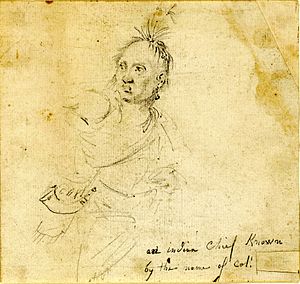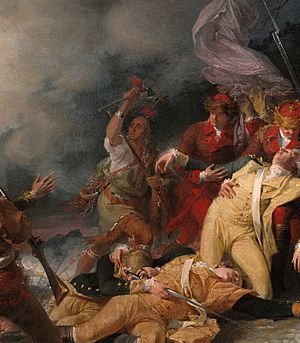Joseph Louis Cook facts for kids

Joseph Louis Cook, also known as Akiatonharónkwen, was an important Mohawk leader. He was also a high-ranking officer in the Continental Army during the American Revolutionary War. Born around 1740, he died in October 1814.
Joseph Louis Cook had an African father and an Abenaki mother. When he was a child, he and his mother were captured during a raid. They were taken to Kahnawake, a Mohawk village near Montreal. There, a Mohawk family adopted them. His mother passed away soon after. Joseph learned French from Catholic missionaries. He grew up to be a respected leader and a brave warrior for the Mohawk people. He fought alongside the French during the French and Indian War.
During the American Revolution, Cook chose to support the American colonists. He fought against the British. He became the highest-ranking Native American officer in the Continental Army. He reached the rank of lieutenant colonel. He led Oneida warriors who were allies of the Americans. After the war, he became an important advisor to the Oneida people in New York. He helped them try to get fair land deals. Later, he settled in Akwesasne, a Mohawk reserve that crosses the border between New York and Quebec, Canada.
Contents
Early Life and Learning
Joseph Louis Cook was born as Nia-man-rigounant. His family was captured in 1745 near what is now Schuylerville, New York. A French officer wanted to make him a slave. But the Mohawk people stepped in and saved him. They took him and his mother to their village of Kahnawake.
Cook was formally adopted by a Mohawk family. He learned their culture and language. In the Mohawk language, his name was Akiatonharónkwen. This means "he unhangs himself from the group." He also learned French from Jesuit Catholic missionaries. Later, he learned English too. People often called him Louis Cook or Colonel Louis.
Fighting in the French and Indian War
Cook lived in the Mohawk village of Kahnawake. He fought with the Mohawk nation on the side of the French. They fought against the British in the French and Indian War. This war was part of a bigger war called the Seven Years' War.
A friend named Eleazer Williams later wrote about Cook's bravery. Cook was at the battle against the Braddock Expedition in 1755. He also served under General Montcalm at the Battle of Fort Oswego in 1756. In the same year, he was hurt in a fight near Fort Ticonderoga.
Cook received his first command in 1758 at the Battle of Carillon. General Montcalm praised him for his actions. He also fought in the Battle of Sainte-Foy in 1760.
After the war, Cook returned to Kahnawake and married Marie-Charlotte. He did not like the British victory. He saw his homeland being taken over by American colonists. So, he moved his family to Akwesasne. This was a Mohawk village along the St. Lawrence River in Quebec.
Role in the American Revolution

Most of the Iroquois nations sided with the British during the American Revolution. They hoped to push the colonists off their lands. But Joseph Louis Cook chose to ally with the Thirteen Colonies. The Oneida and Tuscarora nations also joined the Americans.
As early as 1775, Cook offered his help to General George Washington. In 1776, he met with Washington and John Adams. Cook was with Benedict Arnold on his expedition into Quebec. Even then, he was known as "Colonel Louis."
In New York, Louis Cook fought at the Battle of Oriskany. He also took part in the Saratoga campaign. He led many Oneida and Tuscarora warriors. After the Battle of Klock's Field, Cook chased Sir John Johnson. He was angry that General Rensselaer delayed. Cook accused Rensselaer of being a Tory.
Cook was with the Continental Army at Valley Forge in the winter of 1777. In 1778, he was seen dressed in American uniforms. He was singing a French song. In March 1778, General Philip Schuyler sent Cook to destroy British ships.
On June 15, 1779, Cook officially became a Lieutenant Colonel in the Continental Army. This was the highest rank given to an American Indian during the Revolution. It was also the only known commission given to a man of African descent. In 1780, Colonel Louis led a Native American group to meet General Rochambeau. Officers noted he spoke French perfectly. Louis fought with Lieutenant-Colonel Marinus Willett at the Battle of Johnstown in 1781. This was one of the last battles of the Revolution.
During the war, Cook became a personal enemy of Captain Joseph Brant. Brant was a Mohawk who supported the British. After the war, their conflict caused problems for the Mohawk nation. It almost led to war between different Mohawk groups.
Life After the War
After the war, Cook settled near Sterling, New York. He became an important advisor to the Oneida tribe. He could speak French, English, and Oneida. While living in Onondaga, Cook married Marguerite Thewanihattha. They had several children.
Cook tried to help the Oneida with their land. He convinced them to lease a lot of their land. But many Iroquois lands were lost to New York state. This happened because most Iroquois had allied with the defeated British.
The Oneida chose Cook and Peter Otsequette to talk with Governor George Clinton. They wanted their land back or payment for it. Governor Clinton made only small agreements with the Oneida. Today, some people criticize Cook for these land deals.
Between 1792 and 1796, Cook represented the Seven Nations of Canada six times. He negotiated land deals with New York state. These talks were about lands sold by other Mohawk groups. The Mohawk people of Akwesasne and Kahnawake said those groups did not have the right to sell common Mohawk land. New York kept control of the land. This deepened the disagreement between Cook and Joseph Brant.
By 1789, Cook had settled in Akwesasne. He became an important chief there. He believed the Mohawk people should stay neutral in the War of 1812. This war was between the US and Great Britain. The United States forgot Cook's past service. They held him at Fort Niagara. He was released after showing proof of his army commission and letters from George Washington.
Cook was too old to fight in the War of 1812. But he followed the US Army into Canada. He was present at the Battle of Lundy's Lane. He was hurt in a small fight and fell from his horse. These injuries were very serious. He died in the American camp in October 1814. Cook received a military salute at his funeral. He was buried near Buffalo, New York.
 | Percy Lavon Julian |
 | Katherine Johnson |
 | George Washington Carver |
 | Annie Easley |

